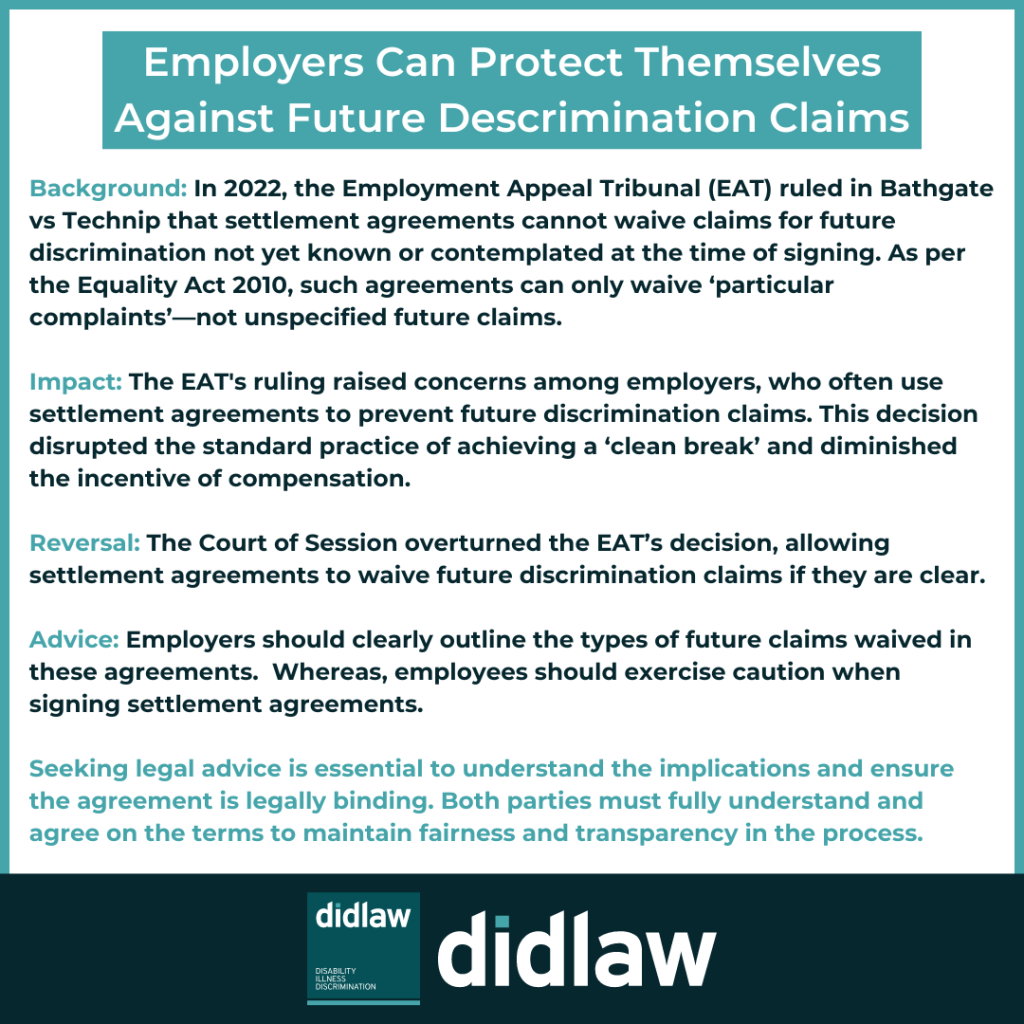
In 2022, the Employment Appeal Tribunal (EAT) issued its decision in the case of Bathgate v Technip. In this judgment, the EAT stated that settlement agreements could not be used to waive claims for future discrimination that had not yet occurred and were not in contemplation at the time of signing the agreement.
The EAT made this decision because section 147 of the Equality Act 2010 states that settlement agreements can only waive a ‘particular complaint’. The EAT decided that settlement agreements could not waive claims for discrimination that had not yet occurred, as unspecified future claims could not be interpreted as ‘particular complaints’ in accordance with section 147.
This judgment caused some shock amongst employers, as they would routinely insert wording into settlement agreements stating that employees would be waiving their right to bring any future discrimination claims. Settlement agreements are usually used to create a ‘clean break’ between employers and employees when an employee is leaving. A standard settlement agreement would therefore usually state that the employee agrees to sign away their right to bring ’all and any claims’, with a few exceptions required by law, in exchange for the payment the employee receives.
The employer would therefore be able to pay the employee a compensation sum and be confident that the employee would not be able to bring any claims against them in future. An important part of this was that the employee would be signing away their right to bring claims for future discrimination, even for discrimination occurring after the settlement agreement is signed. The EAT judgment in Bathgate undermined a significant element of standard settlement agreements and complicated the outcome of a ‘clean break’ which was a key incentive for employers paying compensation to departing employees.
The decision by the EAT in Bathgate has now been overturned by the Court of Session (the Court) (the highest civil court in Scotland). The Court decided that settlement agreements can waive future discrimination claims which occur after the agreement is signed, as long as the types of claim are clearly identified in the wording of the agreement and the objective interpretation of the agreement is that the relevant claims are waived. In this case, the settlement agreement in question did specify that the Claimant would waive age discrimination claims, which was the type of future claim that the Claimant intended to bring despite having signed the agreement.
The reversal of the EAT decision in Bathgate will come as a relief to many employers, who can once again be more confident that their settlement agreements will protect them from employees bringing legal claims against them for future claims. Employees who are offered settlement agreements should be aware that, depending on the wording of the agreement, they could be signing away their right to bring claims against their employer for discrimination which occurs after signing the agreement. This is particularly important to note for employees who sign settlement agreements but continue to be employed by their employer, as opposed to exiting their employment and moving elsewhere.
The effects of a settlement agreement will always depend on the specific wording of the agreement. An employee must take independent legal advice on the terms of any settlement agreement for it to be legally binding and should be advised about the impact of the agreement on future claims.This blog was written by Yavnik Ganguly, solicitor at didlaw.
